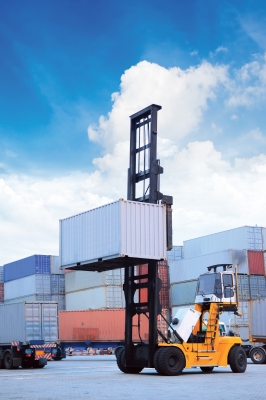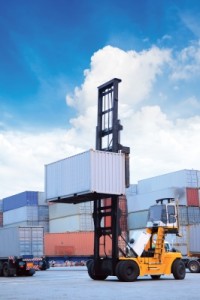

The Bureau of Customs (BOC) has tightened rules for the establishment and supervision of on-dock as well as off-dock customs facilities with the view toward better promoting supply chain security.
Over the weekend, the bureau released two memos on the subject, Customs Memorandum Numbers (CMO) 30-2015 and 32-2015, both signed by Customs Commissioner Alberto Lina and dated September 15.
CMO 30-2015 provides rules for the establishment, supervision, and control of authorized customs facilities (ACF) — wharves, container yards (CYs), container freight stations (CFS), warehouses, examination areas, and other facilities located within customs zones and/or in airports and seaports, and used for temporary handling and storage of imported goods immediately discharged from airplanes, vessels, and other modes of international transport.
The CMO also covers all existing customs bonded warehouses (CBWs), which will now have to undergo BOC review and seek re-accreditation as ACFs.
CMO 32-2015, on the other hand, covers rules for the establishment, supervision and control of off-dock container yards, container freight stations (OCC), and wharves, warehouses, examination areas and other off-dock customs facilities (OCF) located outside of the customs zones used for the temporary handling and storage of imported goods.
The order also applies to all OCFs operated by consolidators and freight forwarders of consolidated cargo, including those handling balikbayan (personal effects) boxes.
Under the general provisions of CMO 32-2015, it was noted that an “OCC or OCF duly established outside the Customs Zone shall be considered an extension of the port subject to customs supervision and control and to be treated like the container terminal inside the Customs Zone in all aspects, subject to whatever additional requirements, rules and conditions which may be imposed by the Commissioner of Customs.
“An OCC shall exclusively handle only Less Container Load (LCL) shipments. An OCF shall exclusively only (handle) Full Container Load (FCL) shipments. A facility shall either be an OCC or an OCF unless the same is given the authority to operate both as an OCC and an OCF. An application to operate both as an OCC and OCF shall be treated as a single application.”
Existing licenses of CY/CFS-OCF at the time of implementation of CMO 32-2015 will remain valid until December 31, 2015. However, all existing CY/CFS-OCF are required to submit their application for issuance of a Certificate of Authority not later than October 31, 2015, according to CMO 32-2015.
New players
The two orders, which will affect at least 30 ACFs (under CMO 30-2015) and 11 off-dock operators (under CMO 32-2015) nationwide, open the possibility of entry of new on-dock and off-dock players.
CMO 32-2015, in particular, said the BOC will “maintain the number of OCCs and OCFs operating in a port to a number consistent with the business requirements of the port for such facilities as provided for under Section 1901 of the TCCP (Tariff and Customs Code of the Philippines).” Section 1901 of the TCCP pertains to rules governing the establishment and supervision of warehouses.
It must be noted that there is a moratorium on the issuance of license for specific types of CBWs (public/private as well as trading CBWs) – in place since 1998 — as well as off-dock operators.
Atty. Agaton Teodoro Uvero, BOC deputy commissioner for Assessment and Operations Coordinating Group (AOCG), told PortCalls the approval of new entrants will depend on the commissioner, noting there have been cases under previous customs administrations when new licenses for CBWs were approved.
Both CMOS were issued to institute guidelines and promote use of customs facilities for “the promotion of security in the supply chain, the proper collection of duties and taxes, the prevention of the entry of drugs and other anti-social goods, the facilitation of the clearance process for imported goods.”
There has been much discussion over some customs facilities being used for technical smuggling, with some operators using to their advantage lax and inconsistent application of BOC rules in order to sell duty and tax-free goods to the local market that should have been just temporarily stored within their facility.
Both CMOs implement the “Authorized Economic Operator (AEO) program established under the World Customs Organization (WCO) SAFE Framework of Standards to Secure and Facilitate Global Trade (SAFE Framework) and the WTO Trade Facilitation Agreement (WTO-FTA) by ensuring integrity and security of cargo in cross-border trade from the supply source to customs clearance to final distribution at the point of destination.”
The voluntary AEO program accredits any party involved in the international movement of goods complying with WCO equivalent supply chain security standards. AEOs may include manufacturers, importers, exporters, brokers, carriers, consolidators, intermediaries, ports, airports, terminal operators, integrated operators, warehouses and distributors. Among the benefits of AEO-accredited companies are increased visibility of goods in the supply chain, reduction in pilferages, and greater efficiency in supply chain management.
Both CMOs likewise aim “to harmonize the electronic cargo information requirements on inbound, outbound, and transit shipments for use in a risk management approach to address security threats and ensure customs compliance.”
The CMOs said operators will have to comply with requirements that may be imposed by the Customs commissioner; make accessible all records to “authorized Customs officials or representatives upon proper demand for ocular inspection”; maintain “inventory and other management records of imported cargoes handled and stored… at all times in their place of business” and make these accessible online to authorized BOC officers.
Requirements for putting up customs facilities
Parties that want to establish and operate an ACF, OCC or OCF must apply in writing to the collection district where the proposed facility is to be located and submit the following documents:
- Application letter
- SEC Articles of Incorporation, Bureau of Internal Revenue certificate of registration, and mayor’s permit (if not yet filed under the Client Profile Registration System or CPRS)
- Location and layout of facility, including machinery, equipment and x-ray facility, as applicable (including lease contract or title to the property)
- Audited financial statement for the last two years immediately before date of application
- Web-based inventory management system
- Customs facility for use of customs complement (or proposed facility)
An ACF, OCC or OCF must have written and verifiable procedures on the following:
- Security procedures for service providers and vendors
- Container security integrity and breach detection measures (e.g. container storage and seals)
- Physical access controls (e.g. security personnel, employee ID system, searches, visitor/vendor verification)
- Personnel security (e.g. pre-employment verification, background checks)
- Procedural security (e.g. cargo control, shipping and receiving, container opening and release)
- Security training and awareness
- Physical security (e.g. fences, gates, parking, building structures, locks and keys, lighting, alarm systems and video surveillance cameras)
- IT security (e.g. password, accountability)
Upon receipt of the application and above documents, the district collector, through the deputy collector for Operations, will direct an inspection of the proposed facility and an evaluation on the merit of the application.
Following receipt of the evaluation and inspection report, the district collector will endorse the same to the director, Port Operations Service for review. The director will submit its final evaluation report to the deputy commissioner for AOCG who will then endorse to the Commissioner the report/recommendation for final approval of the application to operate an ACF, OCC or OCF via the issuance of a Certificate of Authority.
The certificate of authority for ACF, OCC and OCF will be valid for at least three years.
Post application
Once the ACF operator has an authority to operate, the following requirements must be complied with: electronic-to-mobile connectivity; CPRS registration; placement of interest-bearing account, treasury bond or insurance with any government financial institution to cover duties and taxes due on lost or damaged goods transferred to the ACF in the amount provided in the Certificate of Authority; and payment of annual supervision fee of P200,000 for small, P350,000 for medium, and P500,000 for large ACFs.
The same requirements apply for OCCs and OCFs save for a qualification in the interest bearing account / treasury bond / insurance placement from any government financial institution to cover for duties and taxes due on lost or damaged goods transferred to the facilities in the amount of P1 million; and the payment of annual supervision fee of P300,000.
ACFs, OCCs or OCFs requiring renewal of authorization should file the same with the district collector through the deputy collector for operations not later than six months before the authority to operate an ACF, OCC or OCF expires. “Failure to file an application for renewal six months prior to its expiration shall automatically be subject to a penalty in the amount of P100,000,” the two CMOs said.
ACFs, OCCs and OCFs may be closed voluntarily following a written request from the operator to the district collector concerned. The district collector will then require all cargoes remaining with the ACF, OCC or OCF to be released to its consignee upon payment of all customs duties, taxes, and other charges and compliance with applicable laws and regulations.
Suspension conditions
The authority to operate an ACF will be suspended or revoked on any of these grounds:
- When the facility is used to store smuggled goods
- If involved in pilferage
- Cargoes cannot be accounted for
- Overcharging of fees
- Violation of customs laws, rules, and regulations
- Other violations of laws of the Philippines
The same grounds may be used to suspend or revoke the certificate of authority of an OCC or OCF, except for the ground related to overcharging of fees. Uvero said this was deliberately left out of CMO 32-2015 because the BOC is currently looking at updating rates charged by offdock operators. Existing rates, promulgated 14 years ago, are therefore not an ideal gauge to determine overcharging of fees.
READ: BOC: New CY/CFS rates may be released next month
In case of a customs-initiated revocation or cancellation, the district collector will order its deputy collector for operations to conduct an investigation, and the ACF, OCC or OCF operator will be allowed to submit evidence to the contrary, according to the CMOs.
Relocation, expansion or provision of additional facilities requires BOC approval. Establishing additional facilities outside the collection district where the ACF, OCC or OCF acquired its authority to operate is allowed only upon application with the district collector and approval by the Commissioner of the application, which will then be considered as new and original.
Inconsistent rules
Much earlier, Uvero in AOCG Memo No. 3-2015 dated May 14, directed BOC officials to require operators of CBWs, on-dock CY/CFS, arrastre operators, and other facilities that temporarily handle and store imported goods in their ports to apply for license as CBW operators.
READ: BOC tightens control on CBW licensing
At that time, Uvero said “what we have seen is that these rules, procedures, and standards are inconsistent and inadequate, and in many instances, they do not exist at all.
“To illustrate, warehouses at NAIA (Ninoy Aquino International Airport) have existing CBW licenses; albeit, actual operating standards and guidelines vary from one to another. For sea ports, many of these warehouses and similar facilities do not have existing CBW licenses.”
Another example, he added, is that off-dock CY/CFS have CBW licenses, while on-dock facilities mostly don’t.
“These facilities also need to be under customs control and jurisdiction to ensure that imported goods are subject to customs formalities before being withdrawn for local consumption, or for delivery to economic zones, free ports, or CBWs,” Uvero said.
As of September 2014, there are 96 CBW operators registered with BOC although there are a total of 114 warehouses nationwide since some CBW operators manage more than one CBW.
One of the proposed projects early last year was to automate CBW operations and include them in BOC’s electronic-to-mobile system. – Roumina Pablo
Image courtesy of potowizard at FreeDigitalPhotos.net




